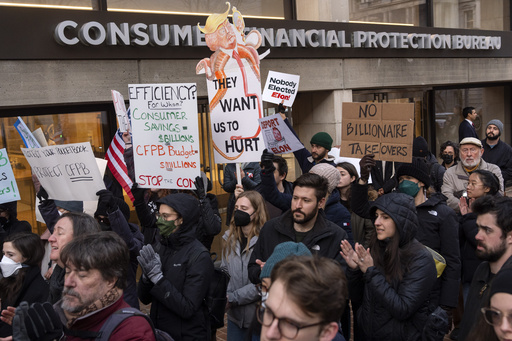
NEW YORK – The Trump administration has recently halted operations at the Consumer Financial Protection Bureau (CFPB), an agency Congress created to oversee various financial sectors, including credit card companies, mortgage lenders, and debt collectors. This move continues a pattern of conservative efforts aimed at diminishing the bureau’s influence. Critics contend that the CFPB operates without enough oversight and frequently overextends its regulatory power, while proponents maintain that the agency plays a necessary role that enjoys bipartisan backing.
Understanding the CFPB’s role is crucial to grasping the implications of its current status. The agency is responsible for implementing regulations and taking action against consumers’ unfair or deceptive experiences in financial transactions, overseeing a range of entities such as banks, mortgage servicers, payday lenders, credit reporting firms, and debt collectors. Under the Biden administration, the CFPB took significant steps to protect consumers by capping overdraft fees and eliminating medical debt from credit reports. The agency has also pursued legal challenges against financial institutions that mislead consumers.
The CFPB was formed as part of the Dodd-Frank Wall Street Reform and Consumer Protection Act of 2010, a legislative response designed to avert future financial crises similar to that of 2008. Since its inception, the bureau claims to have secured nearly $20 billion for consumers through compensation, debt cancellation, and other relief measures.
Recently, the new director of the Office of Management and Budget, Russell Vought, ordered the CFPB to cease all investigations and stop progressing on any proposed regulations. He instructed the agency to pause the enforcement of rules that had been finalized but not yet implemented, effectively shutting down its operations for a week. Vought directed CFPB employees to refrain from tasks that required prior written approval from the Office of Management and Budget’s top lawyer.
Vought confirmed via social channels that the CFPB would maintain its method of funding through the Federal Reserve—an arrangement designed to keep the bureau insulated from congressional budget negotiations. In response to these changes, two high-ranking officials resigned in protest, while Trump appointed Jonathan McKernan, a former member of the Federal Deposit Insurance Corporation board, as the new head of the CFPB.
The CFPB’s actions have often sparked contention, particularly from banking institutions. An example of this occurred in 2017 when the bureau proposed a rule limiting the number of automatic payments that payday loan and high-cost lenders could extract from customers’ accounts. Industry groups challenged the constitutionality of the CFPB’s Federal Reserve funding, but the U.S. Supreme Court upheld the agency’s authority in May 2024.
In the wake of these developments, certain Biden-era regulations are now on hold. A rule limiting bank overdraft fees, anticipated to begin in October, has been suspended following Vought’s directive. This rule would compel major banks to choose one of three options regarding their overdraft policies, while current overdraft fees average around $35. Additionally, another rule aimed at eliminating medical debt from credit reports—set to take effect soon—has also been put on pause due in part to legal challenges.
Critics argue that the halt on these regulations is detrimental to consumers. Lauren Saunders of the National Consumer Law Center highlighted a disconnect between the administration’s campaign promises of reducing costs and the GOP actions that seem to favor high fees and costs for consumers. She stated that the public largely views overdraft fees and medical debt tracking as unjust issues that transcend partisan lines.
The financial industry has had mixed reactions to the CFPB’s strategies under the Biden administration. Lindsey Johnson, head of the Consumer Bankers Association, described the agency’s regulatory focus as excessively aggressive, indicating that it may have acted without proper procedural adherence. Meanwhile, representatives from the Financial Technology Association expressed expectations that numerous CFPB regulations affecting innovative financial products would be reversed quickly under the new administration.
Consumer advocacy groups have voiced their concerns, staging protests outside the CFPB’s Washington D.C. headquarters, which has been ordered shut. NAACP President Derrick Johnson emphasized the importance of the CFPB, stating that its oversight prevents exploitation by major financial institutions. Advocacy leader Kitty Richards warned that without the bureau, consumers become increasingly susceptible to unfair practices, highlighting fears around data privacy, hidden fees, and fraud.

